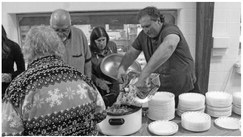Be a hero, donate blood
Editorial
Members of the Courier Sentinel editorial board include publisher Carol O’Leary, general manager Kris O’Leary and Star News editor Brian Wilson.
There are superheroes who walk among us every day. Chances are, you have passed one in the grocery store or gas station, or chatted with them while in line at the bank.
These superheroes come from all walks of life. You may even be one yourself and not realize what a lifesaver you are.
What these superheroes have in common, is that they regularly donate blood and plasma, to keep America’s blood banks stocked in case of need.
Every two seconds, somebody in the United States, needs a blood transfusion.
According to the American Red Cross, approximately 36,000 units of red blood cells are needed every day, in the United States. In addition, 7,000 units of platelets and 10,000 units of plasma are needed daily, in the U.S.
Transfusion recipients include victims of trauma or accidents, as well as those battling cancer or being treated for severe illnesses.
There is no substitute for the life-giving donations. Blood cannot be manufactured. It only comes from donors. The challenge is, that donor numbers are barely able to keep up with demand, and regional and national stocks of blood donations are at a critically low level.
With only about 38 percent of the population eligible to give blood or platelets, it is essential that every person who is able, steps forward to be a hero. Unfortunately, only about 10 percent of eligible donors choose to give blood.
The qualifications are minimal. You must be at least 18 years old (or have parental permission at age 16 or 17), weigh more than 120 pounds, have a valid identification, be free of major organ diseases, not taking antibiotics or have had a recent surgery.
Giving blood is quick and easy, taking about an hour, with only about 10 minutes of that time the actual blood donation. The donating process is generally painless, other than possible discomfort when the needle is inserted.
Beyond giving when supplies are critical, consider getting into the habit of giving blood. Whole blood donations can be made every eight weeks, up to six times a year.
Heroes are those who step up and make a difference in the lives of others, putting thoughts of others, ahead of their own personal discomfort and looking out for the best interests of everyone.
With America’s blood supplies at a crisis level, there is a pressing need for heroes. To find a blood drive near you, contact the American Red Cross at redcrossblood.org, or in Marathon, Langlade, Portage, Taylor and Wood counties, the Blood Center of Northcentral Wisconsin at bcnwi. org.

